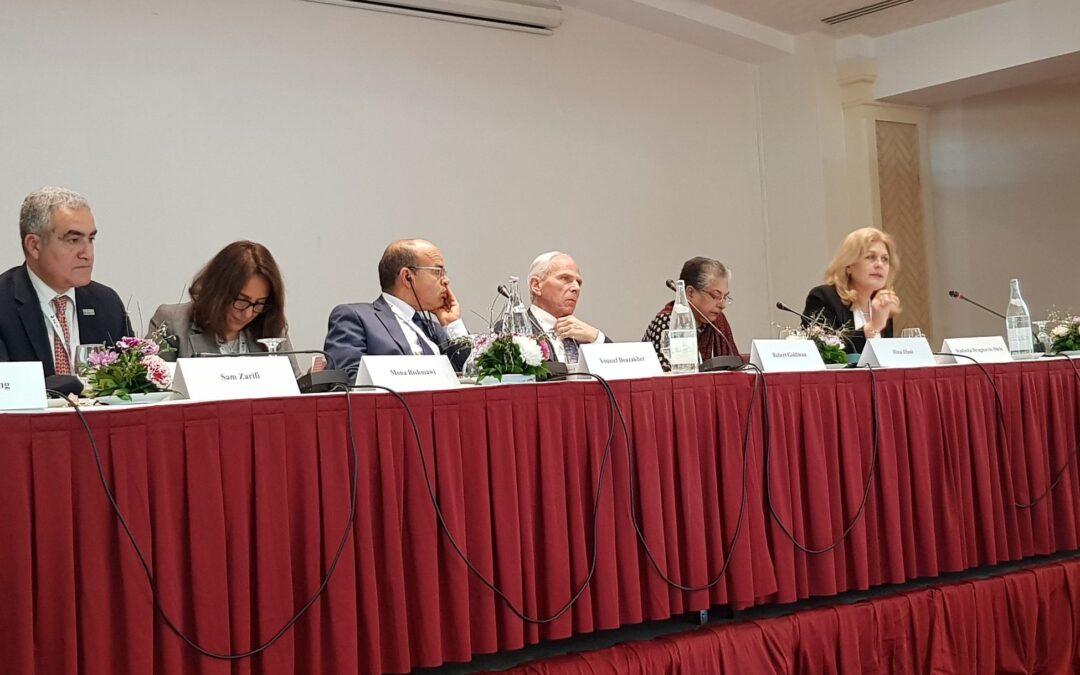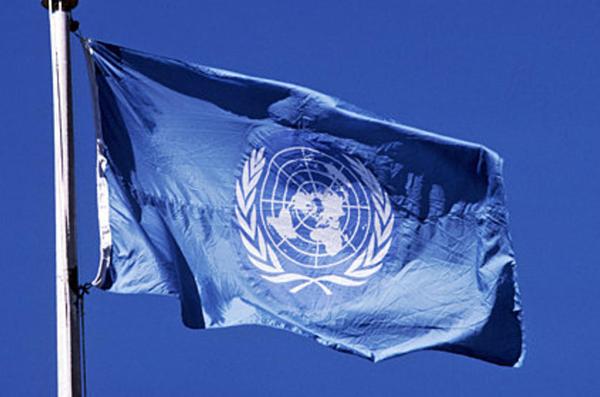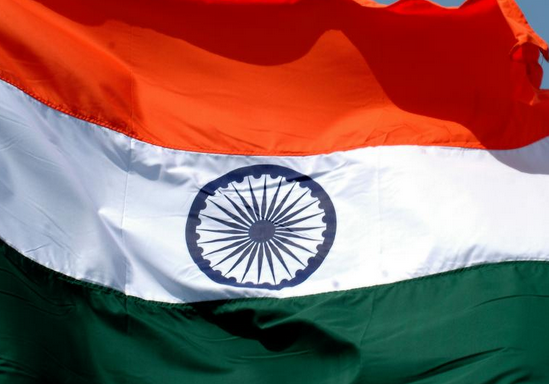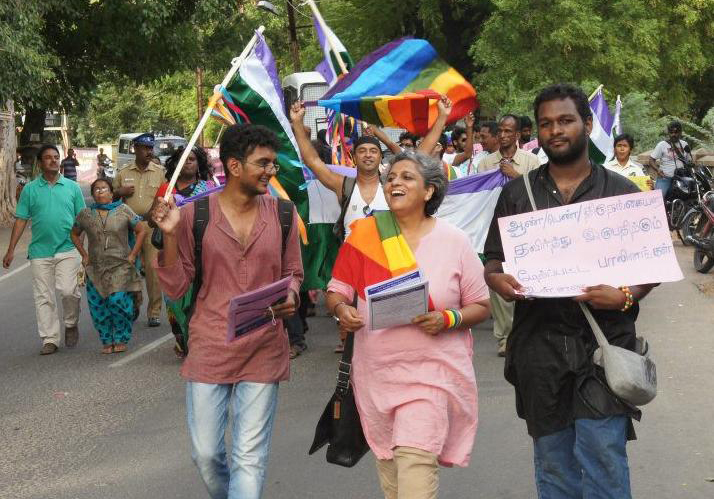
Mar 23, 2019 | News
Some 100 distinguished judges and lawyers from around the world commit to expanding the reach of human rights and rule of law principles, in the face of a global backlash against human rights values. The Tunis Congress is the ICJ’s 18th Global Congress since 1952.
The ICJ World Congress, consisting primarily of jurists serving as Commissioners, ICJ National Section and affiliates, and the ICJ Secretariat, is discussing strategy for concerted action and issue a final Declaration reflecting the outcome.
“Since its founding 1952 the ICJ has been steadfast in its belief in the primacy of human rights grounded in rule of law principles as indispensable for well being of all people, as well as for peaceful and just international order,” said Sam Zarifi, ICJ Secretary General.
“Cynical manipulation by authoritarian populists positions the rule of law and human rights as obstacles to the popular will. But as the ICJ’s experience over the past six decades has shown, the rule of law is inextricably bound with the proper functioning of democracy and to the protection and promotion of human rights,” he added.
The ICJ Congress will focus on five key areas of concern: the independence of judges and lawyers and administration of justice; access to justice and accountability for human rights violations; global security and counter-terrorism; equality and non-discrimination; and fundamental freedoms and civil society space.
“The international human rights legal framework has allowed for huge improvements in the lives of people around the world since the Universal Declaration of Human Rights 70 years ago, and the ICJ has played an important role in the development of this legal framework,” Zarifi said.
“But we are now witnessing a resurgence of some of the dangerous, insidious ideas and practices that have led the world to carnage and chaos in the past: the scapegoating of groups such minorities, refugees and migrants; the undermining of multilateral institutions; and the silencing of civil society and those who are giving voice to those who are marginalized on the basis of their gender, religion, ethnicity, physical capacity or sexual orientation,” he added.
“Global powers such as the United States, Russia, and China are actively attacking the rule of law and respect for human rights around the world, while the European Union is distracted by the politics of xenophobia and fearmongering,” he further said.
“It is now crucial for other States, and for people around the world, to show that respect for the rule of law and human rights are universal values and global demands, and the ICJ is proud to pull together the community of jurists from all regions of the world to support these values and demands,” he added.
In the face of these threats and challenges, the Congress will consider means to defend and strengthen the rule of law and legal protection of human rights globally, regionally and in individual countries.
The ICJ is made up of around 60 distinguished judges and legal practitioners from all parts of the world and diverse, works on all five continents and addresses human rights protection in dozens of countries.

Feb 13, 2019 | Advocacy
Entitled “Developing principles to address the detrimental impact on health, equality and human rights of criminalization with a focus on select conduct in the areas of sexuality, reproduction, drug use and HIV”, the ICJ statement was delivered today at the UN.
The ICJ statement, delivered during the Consultation on Human Rights in the HIV response organized by the UN High Commissioner for Human Rights in collaboration with UNAIDS, focused on the need to engage jurists in addressing the detrimental impact on equality, health and human rights, of criminalization of sexual and reproductive healthcare services, including abortion; of consensual sexual conduct, including consensual sex work, consensual sex outside marriage, consensual same-sex relations, and consensual adolescent sexual activity; of drug use, of possession of drugs for personal use; and of HIV non-disclosure, exposure and transmission.
Download the full statement:
Universal-ICJ statement HIV-Advocacy-2019-ENG

Dec 19, 2018 | News
The Transgender Persons (Protection of Rights) Bill, 2018 fails to protect the human rights of transgender people as guaranteed under the Indian constitution and international law and standards and must not be passed in its present form by the Rajya Sabha.
The Bill was passed by the Lok Sabha (Lower House of Indian Parliament) on 17 December, 2018. The next step in order for the Bill to progress is for the Rajya Sabha (Upper House of Indian Parliament) to pass it.
The ICJ considers this Bill to be a missed opportunity to address the serious problem of discrimination against transgender people in India. The ICJ calls for the rejection of its problematic parts by the Rajya Sabha and for the elaboration of a revised Bill in line with rights upheld by the Indian Supreme Court and India’s obligations under international law.
The 2018 Bill, if adopted, would effectively deny to most transgender people their right to self-identification, by providing an overly complex bureaucratic procedure requiring an individual’s application for a transgender certificate to be approved by two different sets of authorities, despite earlier widespread condemnation of this process by the transgender community.
“As the ICJ reported in 2017, the transgender community is continually harassed, stigmatized, and abused by the police, judges, their family and society. This Bill, if it becomes law would further serve to facilitate and compound human rights violations against people from a marginalized community”, said Ian Seiderman, Legal and Policy Director at the ICJ.
The Bill has also introduced mandatory sex reassignment surgery for those transgender people who seek to identify their gender within the binary (male/female) framework. This requirement would be in contravention of the Supreme Court’s judgment in NALSA v. UOI, which guarantees the right to self-identification without the need for medical intervention.
Further, the Bill would collapse all offences against transgender people into one provision which includes offences ranging from “sexual abuse” and “physical abuse”, to “compel[ing] or entice[ing] a transgender person to indulge in the act of begging” among others. These crimes have not been defined in the Bill.
It also would provide for the same six-month to two-year sentence for all offences against transgender people. In some cases, this could be a significantly lighter sentence than when the same crime is committed against others, including discriminated groups such as cis-gendered women, under the general criminal law. In addition, the identification of “beggary” as an offence under the Bill is problematic since for many transgender people in the country, it remains one of the limited livelihood opportunities.
Further, the Bill does not address the question of reservations in employment and education despite specific directions by the Supreme Court in NALSA v. UOI.
Lastly, while the proposed law guarantees the right to non-discrimination to transgender people against persons, state and private sector bodies, it does not provide a definition of discrimination, nor does it provide an enforcement mechanism for ensuring transgender people’s right to non-discrimination.
The ICJ calls on the Rajya Sabha to substantially revise the problematic provisions of the Bill before resubmitting it for parliamentary consideration.
Background
The provisions identified above do not accord with protection of the rights of transgender people to equality, non-discrimination, equal protection of the law, enshrined in the Constitution and international law, including the International Covenant on Civil and Political Rights, which India ratified in 1979. Further, they are incompatible with international standards such as the Yogyakarta Principles on the application of international human rights law in relation to sexual orientation and gender identity.
The ICJ, as part of SAATHII Vistaara Coalition, earlier this year drafted a Briefing Paper on India: Legal and Jurisprudential Developments on Transgender Rights, SAATHII Vistaara Coalition. The paper analyses in detail the domestic judicial developments on transgender rights as well as the legislative process undertaken until the Transgender Persons (Protection of Rights) Bill, 2018 was passed on 17 December 2018.
Additional Reading Material
- ICJ Briefing Paper on The Transgender Persons (Protection of Rights) Bill, 2016, analyzes the 2016 Bill, its shortcomings, and India’s international obligations, as it is the basis of the 2018 Bill.
- ICJ Briefing Paper on Implementation of NALSA Judgment discusses the 2014 April NALSA decision that affirmed that transgender people have the right to decide their self-identified gender. The paper analyses the responsibilities placed on Indian authorities, gaps in implementation, and India’s relevant international law obligations.
Contact
Maitreyi Gupta (Delhi), ICJ International Legal Advisor for India
e: maitreyi.gupta(a)icj.org, t: +91 7756028369

Nov 20, 2018 | News
On the Transgender Day of Remembrance, the ICJ calls on all South Asian States to fulfill their international obligations to respect, protect and ensure the right to life of all transgender persons, including by investigating alleged violations of their right to life promptly, thoroughly and effectively.
While there has been some progress in protecting the human rights of transgender individuals through legislation and judicial decisions, in South Asia rampant violence from both state and non-state actors continues to place their lives at risk.
Most governments do not collect data on violence against transgender persons.
Trans Murder Monitoring, which records cases of murder of transgender persons based on accounts from individuals and civil society organizations, reports 2609 unnatural deaths of trans and gender-diverse persons across 71 countries between January 2008 and September 2018.
In South Asia, between 2008 and 2016, 58 transgender persons were reported murdered in India, 37 in Pakistan, 2 in Nepal, and 2 in Bangladesh.
“It is laudable that Pakistan, India and Nepal have taken measures to end discrimination against transgender persons, and have recognized their right to self-identify,” said Frederick Rawski, ICJ Asia-Pacific Director.
“However, violence, harassment, extortion, rape and murder of transgender persons continue to be committed. Police frequently refuse to file complaints, and are often themselves complicit in violence against transgender persons,” he added.
The judiciary has played an important role in protecting transgender rights in India, Nepal and Pakistan.
The Supreme Courts in all three countries have issued decisions recognizing transgender persons’ rights, including the right to self-identity one’s gender.
These decisions have acknowledged that transgender persons are particularly targeted with violence by state and non-state actors, and that police have largely failed to protect them from violence.
In some cases, the courts have ordered that new remedies be created under the law, and sought the enforcement of existing laws protecting transgender rights.
However, many of these decisions remain unimplemented, and violence against transgender people remains rampant in South Asia.
“The ICJ calls on all governments in the region to ensure that laws, policies and practices affecting transgender persons comply with international human rights law and standards,” Rawski said.
“All human rights abuses against transgender persons must be investigated, and the perpetrators brought to justice, including law enforcement officials who harass or abuse persons based on their gender identity,” he added.
Contact
Frederick Rawski, ICJ Asia Pacific Director, t: +66 644781121 ; e: Frederick.rawski(a)icj.org
Background
In India, in 2014, the Supreme Court in NALSA v. UOI recognized the right of transgender persons to self-identify their gender.
The Court has further acknowledged the existence of human rights violations against transgender persons at the hands of the police and private individuals and recommended that state and central government take steps to create public awareness about transgender persons’ rights.
Per a 2015 survey by the Kerala Government, “52% of the TGs [transgender people] are facing harassment from the police and “96% do not raise complaints against violence because of their gender identity”.
In Nepal, in 2007, the Supreme Court in Sunil Babu Pant v. Government of Nepal recognized the right of individuals to identify as male, female or “third gender”.
However, transgender persons continue to face arbitrary harassment and detention by security forces under laws like Public Offences Act, 1970, which allow for arrests without due process for up to 25 days.
This resulted in the Supreme Court of Nepal ordering law enforcement officials to desist from arresting persons based on their “personal interest or appearance,” though the decision remains largely unimplemented.
In Pakistan, in 2009, the Supreme Court directed the Government to recognize the human rights of transgender persons and subsequently, in 2018, the Parliament passed a law prohibiting discrimination against transgender persons.
The Transgender Persons (Protection of Rights) Act, 2018 of Pakistan prohibits harassment of transgender persons, including sexual, physical, mental and psychological harassment, and creates new remedies for complainants in addition to those available under the criminal justice system.
The effectiveness of the law remains to be seen, as police are often complicit in violence against transgender persons, particularly in extorting money from transgender women sex workers.
Read also
ICJ Practitioners’ Guide No. 4: Sexual Orientation, Gender Identity and International Human Rights Law, which provides legal practitioners, activists and policy-makers with detailed and practical references on international standards on sexual orientation, gender identity, gender expression, and sexual characteristics.
ICJ Comparative Law Casebook: Sexual Orientation, Gender Identity, and Justice, which provides legal practitioners, activists and policy-makers with a compilation of legal cases on sexual orientation, gender identity, gender expression and sex characteristics.
ICJ India 2017 Report: “Unnatural Offences” Obstacles to Justice in India Based on Sexual Orientation and Gender Identity, which provides a legal analysis of the discrimination and abuse faced by the LGBTI community in India based on over 100 interviews with LGBTI persons.

Oct 24, 2018 | News
The ICJ started its 60th anniversary in Geneva with an evening gala hosted by Ambassador Julian Braithwaite, at his residence on 18 October 2018. A moving speech by Sir Nicolas Bratza (photo), ICJ Commissioner and Executive Committee member, on the importance of the defence of the rule of law opened the evening.
It was followed by a magnificent concert by Menuhin Academy virtuoso, violinist Vasyl Zatsikha. A magical evening.
The speech of Sir Nicolas Bratza
“I feel very privileged to have been asked to say a few words by way of introduction to the speech of the Secretary General of the ICJ.
May I begin by expressing on behalf of us all the warmest thanks to the British Ambassador for hosting this very special celebration of the 60th anniversary of the ICJ in its home in Geneva.
Anniversaries are always important occasions and never more so than when they mark a milestone in the life of a remarkable organization that has throughout its existence worked tirelessly to safeguard the rule of law and human rights and that has done so, in particular, by protecting and defending the independence of judges and lawyers.
My association with the ICJ has been relatively brief but for many years I have admired its work from afar, as a member of the European Commission of Human Rights for five years and as a judge of the Strasbourg Court, for fourteen.
The Court and the ICJ share the common purpose – to protect the fundamental principles of democracy, the rule of law and human rights.
Without the independent and impartiality of judges, both national and international, those principles would be meaningless and might as well have been written on water.
With the alarming growth of populism in countries across the world, the threats to the independence of the judiciary are regrettably as real today as they have been at any time.
In the international Court of which I was a member, judges are nominated by the States from which they are drawn.
But they are in no sense representatives of those States and are not infrequently faced with having to decide cases, sometimes cases of acute sensitivity, against their own countries.
The pressures on judges of the Court are often intense and there are notorious examples where the courage shown by a judge in maintaining his or her rigorous independence has come at a cost, the judge being punished by not being renominated by the State, by returning to the country at the end of their mandate without employment or means of livelihood, or by being unable to return safely to their home at all.
But if the position of the international judge is difficult enough, that of the national judge in certain States, including member States of the Council of Europe, is far worse, their independence and security, both physical and professional, being under constant threat.
In the 1990s and in the early years of this century, the signs were promising. One was able to witness a slow but steady improvement in adherence to the rule of law on the part of new democracies.
This was in no small measure due to the work of organizations such as the ICJ which, through its writings, seminars and training of judges and lawyers worldwide, did so much to strengthen and support judicial independence and to expose the most flagrant examples of abuse and undermining of that independence.
I regret to say that in more recent years the landscape has become much darker, with open and insidious attacks on members of the judiciary, the arbitrary removal of judges from their posts and measures taken to curtail the powers of judges and courts or to undermine their authority and independence.
In my official visits to member States as President of the Strasbourg Court, I met several judges who voiced their deep concern about the steps being taken both by the legislature and the executive to compromise their independence and to diminish their authority. It is not only in the new democracies that such a phenomenon has become apparent.
There has been a growing trend in many parts of Europe to undermine the standing and authority of the judiciary by outspoken attacks on judges for unpopular decisions, by members of the executive, by parliamentarians and by the media.
It is these challenges to judicial independence and to the rule of law that make the role of the ICJ and the continued support of the diplomatic community not only more relevant but more vital than they have ever been.
It is with pride and pleasure that I wish the ICJ a very happy anniversary on this its first 60 years of life in this great city.
But I combine this with a fervent hope that, with the support of us all, the ICJ is able to continue its extraordinary work for the next 60 years and far beyond. The protection of the rule of law and human rights depend on it.”









